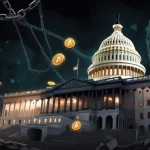CFTC Crypto Sprint: Bitcoin Regulation Push Meets White House Goals and Agency Turmoil

CFTC Crypto Sprint Accelerates: Bitcoin Regulation Push Faces White House Ambition and Agency Chaos
The Commodity Futures Trading Commission (CFTC) has kicked off the next phase of its “Crypto Sprint” initiative, a bold step to shape the future of digital asset trading in the U.S. under the Trump administration’s aggressive vision to crown America as the global crypto powerhouse. But while the promise of regulatory clarity sparks hope for Bitcoin and beyond, the CFTC’s internal disarray and leadership battles threaten to turn this sprint into a stumble. Let’s break down the latest before diving into the messy underbelly of this regulatory saga.
- CFTC Crypto Sprint Phase 2: Public feedback sought on White House digital asset goals, due by October 20, 2025.
- Trump’s Bold Agenda: Aims to make the U.S. the “crypto capital” with federal-level trading.
- Agency Struggles: Staff cuts, enforcement delays, and leadership uncertainty loom large.
- Risk of Oversight Gaps: Internal issues could expose markets to fraud or manipulation.
White House Ambition vs. Agency Reality
On Thursday, acting CFTC chair Caroline Pham announced the latest chapter of the “Crypto Sprint”, a program that launched on August 1 with a focus on spot crypto trading—essentially, buying and selling cryptocurrencies for immediate delivery, unlike futures contracts that bet on future prices. This phase invites public input on recommendations from the President’s Working Group on Digital Asset Markets report, with a deadline of October 20, 2025. It’s a direct nod to the Trump administration’s push for immediate federal-level trading of digital assets, a move Pham framed with uncharacteristic regulatory optimism.
“The Trump Administration has ushered in a new dawn for crypto, and it’s up to market participants to seize this opportunity to be a part of the Golden Age of innovation,”
she stated, hinting at a transformative era for markets long plagued by uncertainty.
The White House is all-in on this vision. A spokesperson emphasized the stakes, stating,
“President Trump has made it a priority to make America the crypto capital of the world, and in doing so has called for the revitalization of the Commodity Futures Trading Commission to play a larger role in securing this promise.”
For Bitcoin maximalists in our community, this resonates deeply— a chance to cement BTC as a cornerstone of a new financial order, free from the grip of traditional banking. But here’s the rub: the CFTC, tasked with overseeing commodities like Bitcoin (which it classifies as such), is reportedly a bureaucratic dumpster fire. Bloomberg sources paint a grim picture of staff cuts and operational turmoil slowing enforcement actions. A pending market structure bill that could shift most crypto oversight to the CFTC only amplifies the concern—can an agency on life support handle such a massive responsibility?
Leadership Limbo: Who Controls the Wheel?
Adding fuel to the chaos is the stalled nomination of Brian Quintenz as CFTC chairman, handpicked by Trump but mired in controversy. The Senate Agriculture Committee delayed a confirmation vote at the White House’s own request, leaving the agency in limbo under acting chair Pham. Quintenz, a former CFTC commissioner known for advocating balanced crypto regulation during his 2017-2021 tenure, faces pushback from heavy hitters like Gemini co-founders Tyler and Cameron Winklevoss. The twins reportedly urged Trump to reconsider, with details emerging around the controversy over his nomination. Gemini, for those new to the space, is a major crypto exchange, and the Winklevoss brothers often wield influence on policy debates, typically favoring rules that bolster established players.
Yet, not everyone agrees. A coalition of crypto organizations sent a letter to Trump championing Quintenz, declaring,
“Mr. Quintenz possesses a singular capacity to advance sound and clear regulation that will foster responsible growth and innovation. He is, quite simply, the right person at the right time to lead the CFTC.”
This clash isn’t just gossip—it’s a window into a darker issue. If industry insiders can sway leadership picks, are we seeing regulatory capture unfold in real time? Could smaller projects or privacy-focused initiatives—core to Bitcoin’s ethos—get sidelined by rules shaped for the big fish? For everyday hodlers and traders, this drama isn’t abstract; it’s about whether the CFTC will prioritize innovation or cronyism, a concern echoed in discussions about the implications of Quintenz’s potential leadership.
Regulatory Clarity: Boon or Bane for Bitcoin and Altcoins?
The “Crypto Sprint” isn’t flying solo—it’s paired with the Securities and Exchange Commission’s (SEC) “Project Crypto,” led by SEC Chairman Paul Atkins and Commissioner Hester Peirce. Together, they aim to untangle years of regulatory mess where the CFTC claims Bitcoin as a commodity, while the SEC often eyes tokens like Ethereum as potential securities—think of it as debating whether gold is just a metal or a stock certificate. Pham acknowledged the joint effort, noting the wave of stakeholder support for the initiatives as a response to Trump’s call for American leadership in crypto, an agenda shaped by broader Trump administration crypto policies. The goal? Bitcoin regulatory clarity that could stabilize prices and drive mainstream adoption, giving investors and developers a predictable sandbox to play in.
Altcoins stand to gain too. Ethereum, for instance, powers decentralized finance (DeFi)—a ecosystem of apps like Uniswap that let users trade or lend without middlemen—yet it’s often caught in SEC debates over whether it’s a security. A CFTC-SEC handshake could unshackle DeFi innovation, filling niches Bitcoin doesn’t touch with its focus on being digital gold. But there’s a flip side for decentralization purists. Federal oversight often brings Know Your Customer (KYC) and Anti-Money Laundering (AML) rules, requiring users to reveal identities— a direct clash with Bitcoin’s pseudonymity. Remember the uproar over FinCEN’s 2020 proposal to track self-hosted wallets? That’s the kind of friction we might see again, potentially alienating the very community that built this space. So, while clarity could accelerate adoption, it risks wrapping Bitcoin in the same red tape it was meant to escape.
Global Stakes: Can the U.S. Keep Up?
Zoom out, and the U.S. isn’t the only player in this game. While the CFTC fumbles, the European Union’s Markets in Crypto-Assets (MiCA) regulation offers a unified licensing framework for crypto firms, already luring projects with its coherence. Singapore, too, is rolling out progressive policies that balance oversight with innovation, becoming a magnet for blockchain startups. Meanwhile, American gridlock—between agency dysfunction and political infighting—risks a blockchain brain drain. If the CFTC can’t get its act together, with ongoing internal challenges affecting cryptocurrency oversight, the U.S. might lose its shot at being the crypto capital, no matter how loud Trump’s rhetoric gets. It’s a harsh reality check: the world isn’t waiting for Uncle Sam to debug its code.
Pham seems to grasp the urgency, stressing public feedback as key to shaping rules for leveraged or retail trading on registered exchanges, a process detailed in recent updates on the Crypto Sprint initiative. But with enforcement at a crawl and staff stretched thin, is this collaborative spirit genuine, or just a stalling tactic? The crypto community deserves more than lip service—we need a regulator that can match the speed of a 10-second block time, not a decade-long committee meeting.
What’s Next for Crypto Sprint?
Looking ahead, the October 20, 2025, feedback deadline marks a critical checkpoint. Could we see draft rules by early 2026, setting the stage for Bitcoin to challenge legacy finance head-on? Or will Quintenz’s nomination drama and internal woes push timelines into bureaucratic purgatory? From an effective accelerationist lens, regulatory clarity—despite its risks—could turbocharge Bitcoin’s rise as a global reserve asset, disrupting fiat faster than any central bank could pivot. Public input offers a chance to steer this ship, but only if the CFTC can execute without tripping over its own red tape. Every wallet, node, and satoshi hinges on what comes next, with community conversations buzzing over at platforms like Reddit about Bitcoin regulation.
Key Takeaways and Questions for Crypto Enthusiasts
- What Is the CFTC Crypto Sprint Initiative and Its Goals for Bitcoin?
It’s a CFTC program to fast-track regulatory frameworks for digital asset trading, focusing on spot markets like Bitcoin, with the latest phase seeking public input by October 20, 2025, to align with White House goals for U.S. crypto dominance. - Can Trump’s Vision Make America the Crypto Capital with CFTC Policy?
It’s feasible if Bitcoin regulatory clarity drives adoption, but CFTC struggles and global competitors like the EU could undermine the plan if execution falters. - Why Is Brian Quintenz’s CFTC Nomination So Controversial for Crypto?
Industry figures like the Winklevoss brothers argue he’s misaligned with Trump’s disruptive goals, while others see him as a steady hand, exposing a rift over whether regulation should favor innovation or control. - How Will CFTC-SEC Clarity Impact Bitcoin and Ethereum DeFi Growth?
Clear rules could boost Bitcoin’s stability and investor confidence, while Ethereum’s DeFi ecosystem—like Uniswap—might escape SEC uncertainty, though oversight could clash with decentralization ideals. - Are CFTC Internal Issues a Threat to Bitcoin Market Safety?
Yes, staff cuts and enforcement delays risk weak oversight as crypto markets expand, potentially leaving Bitcoin and altcoin investors vulnerable to fraud or manipulation at a pivotal moment.
The CFTC’s push, backed by White House ambition and paired with SEC collaboration, dangles the promise of a new era for crypto—a “Golden Age” as Pham calls it. Yet, with an agency teetering on collapse and industry influence casting shadows, this sprint could just as easily veer into a swamp of red tape and favoritism. Will the regulators match the relentless pace of blockchain, or choke under their own weight? Every satoshi in your stack hangs on the answer.



